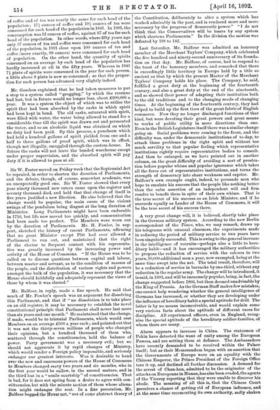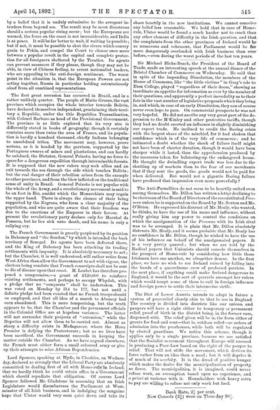Alarm appears to increase in China. The statesmen of Pekin
have detected the want of unity among the European Powers, and are setting them at defiance. The Ambassadors have recen,tly demanded to be received within the Palace itself; but as their Memorandum began with an assertion that the Governments of Europe were on an equality with the Chinese Emperor, the Prince President of the Foreign Office tore it up, and declined all further discussion. A demand for the arrest of Chan-han, admitted to be the originator of the attacks on Europeans in Hunan, has also been evaded, the agents of the Viceroy reporting that they were unable to discover his abode. The meaning of all this is, that the Chinese Court perceives a chance of getting rid of European influence, and at the same time recementing its own authority, sadly shaken
by a belief that it is unduly submissive to the arrogant in- truders from beyond sea. The result may be most disastrous should a serious popular rising occur; but the Europeans are warned, the force on the coast is not inconsiderable, and India is at peace. It will be far better to wait, if waiting be possible ; but if not, it must be possible to shut the rivers which convey grain to Pekin, and compel the Court to choose once more between a popular revolt in the capital and complete protec- tion for all foreigners sheltered by the Treaties. Its agents can prevent massacre if they please, though they may not be able, in view of Chinese feeling, to arrest nationalist leaders, who are appealing to the anti-foreign sentiment. The worst point in the situation is, that the European Powers are not acting together, Russia in particular holding ostentatiously aloof from all combined representations.

































 Previous page
Previous page